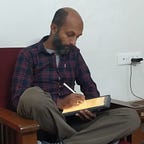The Trinity in a carrybag
For the coming week ( June 11, 2016), the lectionary portion focusses on the Trinity. The theme is We believe in the Holy Trinity.
So before I get into serious preparation, I would like to collect a few thoughts on the trinity in a carry bag — more like a virtual carry bag, which will be this blogpost.
I fetched this image of the trinity a few years ago while working on our seminary magazine.
The Trinity is the Christian understanding of God.
Christianity does believe in one God but it is not the kind strict monotheism like the kind Islam propagates. God revealed himself as the Father, Son and Holy Spirit and is found to be co-existent. It was the peoples’ experience of the God of the Israelites that gave rise to an understanding of Yahweh, who promised the Messiah to save his people from their sins. The Holy Spirit, or Spirit of God, as we see in Genesis 1 appears as existent from the very beginning.
Perichoresis
Three great theologians of the 4th century, Basil the Great, Gregory of Nyssa and Gregory of Nazianzus ( known together as the Cappadocian Fathers), in their writings keep referring to the Holy trinity. One of their writings gives the beautiful analogy of dance to illustrate the difficult theological concept of the Triune God. In describing their relationship with each other as Perichoresis, or dancing together, the Cappadocians picture the three persons of the Trinity moving together, like in a choreography, as one.
Mission, then becomes joining the perichoretic dance of the Trinity. Alister McGrath suggests that it “allows the individuality of the persons to be maintained, while insisting that each person shares in the life of the other two. An image often used to express this idea is that of a ‘community of being,’ in which each person, while maintaining its distinctive identity, penetrates the others and is penetrated by them.”
Do you want to dance with God? Who could refuse?
In the Trinity we have our identity
In the beginning, God created the heaven and earth. We read about the Spirit of God hovering over creation. Genesis 1 continues with verse 3 which begins, “And God said,…”. John 1 attributes that in beginning was the Word and the Word was God. What is translated as the Word is actually the Greek word Logos which was a classical Greek philosophical concept that referred to a universal divine reason immanent in nature. Jewish philosophers like Philo tried to understand the burgeoning influence of Greek Philosophy on Jewish religion and culture and reconciled it with presenting the Word / Logos as present in the Old Testament. He presented the Logos as God’s creating Word.
Thus we see the presence of all three persons of the Trinity in the first chapter itself, played out in various ways across the Bible till the revelation.
In Trinity we have our true existence.
Since Jesus is our path to God, we take his words regarding a meaningful life seriously. In John 14, he says:”Don’t you believe that I am in the Father and the Father is in me? The words I say to you are not just my own. Rather it is the father living in me who is doing the work “(14:10).
It reflects the co-existence of the God head. Jesus who is fully human and fully God says that it is possible for humans to live in God and to have God in them. He says in John 14:20:
“On that day you will realise that I am in my Father and you are in me and I am in you.”
A co-existence with God is possible, as revealed by Christ. As he prepares them for his departure he promises them the Holy Spirit,
“you know him for he lives with you and will be in you.”
The gift of the Spirit is also so that they will have the presence of Christ always with them, which will guide them in all Truth.
If am man remains in me and I in Him, he will bear much fruit (John 15:5)
Life becomes meaningful when we exist in Christ, which means to exist with and in the Triune God, obeying His will and commands, being guided by the Truth, and bearing fruit.
A true, meaningful existence is in the Trinity.
In Trinity we have our mission
Matthew 28. 19–20, often touted as the Great Commissioning of Christ.
The risen Lord addresses the disciples saying that he has received all authority (Matt 28:18). That is the reason we find a therefore in the next verse. Go, therefore ( because Jesus Christ has authority) and make disciples, baptising them in the name of the Father, Son and the Holy Spirit, and teaching to obey everything that I have commended you, is what Jesus says.
The placing of the risen Son alongside the Father and the Holy Spirit emphasise his authority which is from above, and baptism is the consecration of the person to the God to whom s/he belongs. In short, the ministry involves bring them back to the God who made them, and teaching them to walk in His ways. This is the mission of everyone marked by Christ.
A carry bag has limited space, so here I conclude these jottings for now, knowing fully well that it is in no way conclusive.
Originally published at Materati.
